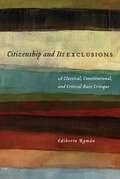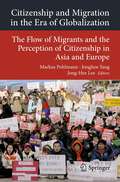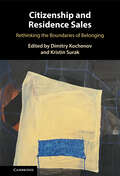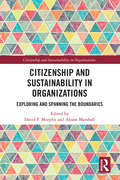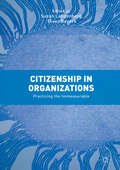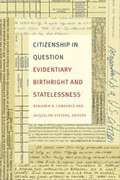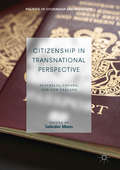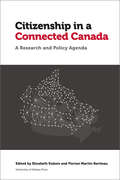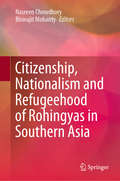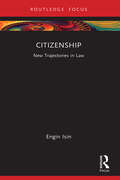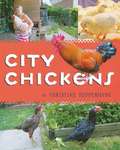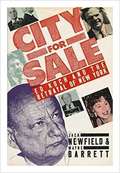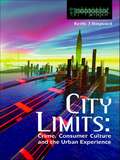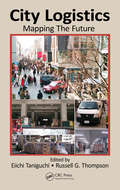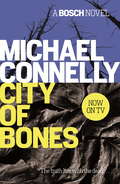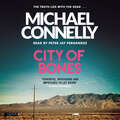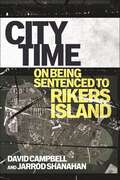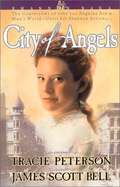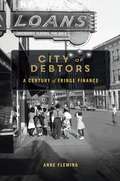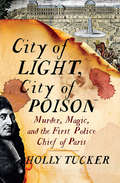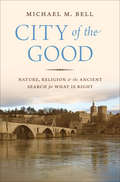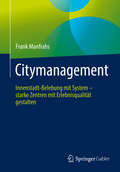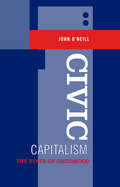- Table View
- List View
Citizenship and Its Exclusions: A Classical, Constitutional, and Critical Race Critique (Critical America #55)
by Ediberto RománCitizenship is generally viewed as the most desired legal status an individual can attain, invoking the belief that citizens hold full inclusion in a society, and can exercise and be protected by the Constitution. Yet this membership has historically been exclusive and illusive for many, and in Citizenship and Its Exclusions, Ediberto Román offers a sweeping, interdisciplinary analysis of citizenship’s contradictions.Román offers an exploration of citizenship that spans from antiquity to the present, and crosses disciplines from history to political philosophy to law, including constitutional and critical race theories. Beginning with Greek and Roman writings on citizenship, he moves on to late-medieval and Renaissance Europe, then early Modern Western law, and culminates his analysis with an explanation of how past precedents have influenced U.S. law and policy regulating the citizenship status of indigenous and territorial island people, as well as how different levels of membership have created a de facto subordinate citizenship status for many members of American society, often lumped together as the “underclass.”
Citizenship and Migration in the Era of Globalization: The Flow of Migrants and the Perception of Citizenship in Asia and Europe (Transcultural Research – Heidelberg Studies on Asia and Europe in a Global Context #5)
by Jong-Hee Lee Markus Pohlmann Jonghoe YangIn an age of globalization there is frequent migration across national borders, resulting in a reconsideration of the notion, practice and social institution of national citizenship. Addressing this phenomenon, the book focuses on the exchange between, and responses, of Korea and Germany. In particular, the book deals extensively with citizenship in Korea where the concept of citizenship is young, and thus the study of citizenship is relatively scarce. This book may be the first of its kind, bringing together eminent Korean and German scholars to analyse various aspects of citizenship in Korea. It is hoped that it will contribute to scholarship in the fields of citizenship and migration and to an understanding of the flow of people and ideas between Asia and Europe.
Citizenship and Residence Sales: Rethinking the Boundaries of Belonging
by Kristin Surak Dimitry KochenovCitizenship and residence by investment is a fast-growing global phenomenon. As of 2022, more than a third of all countries in the world offered paths to membership in exchange for a donation or investment into their economies. Yet we know little about how these programmes operate and debates in academia and the wider public are often misinformed by sensationalist cases. This book offers a multidisciplinary exploration of both citizenship and residence by investment on a global scale. Bringing together the expertise of leading legal scholars, economists, sociologists, political scientists, and historians, it provides an informative and empirically grounded assessment of the origins, operation, key causes, and the legal bases of the investment migration programmes. By so doing, the volume demystifies citizenship and residence by investment and takes a critical postcolonial global perspective, addressing key issues in belonging, exclusion, and inequality that define the world today.
Citizenship and Sustainability in Organizations: Exploring and Spanning the Boundaries (Citizenship and Sustainability in Organizations)
by David F. Murphy; Alison MarshallCitizenship and Sustainability in Organizations: Exploring and Spanning the Boundaries is the introductory book in the series of the same name and draws upon new conceptual thinking from some of the leading contributors to The Journal of Corporate Citizenship on topics of social responsibility, organizational citizenship, influencing and leading change for sustainability and individual agency. Chapter authors are influential thinkers, pushing the boundaries of conventional thinking about corporate citizenship and sustainability to generate inovative ideas, models and practices. The book’s core message is that the contexts within which organizations and individuals act are undergoing significant change and disruption. Existing corporate social responsibility (CSR), corporate citizenship and business sustainability models and frameworks need to be adapted, abandoned or transformed. This book represents a starting point for dialogue about these challenges and presents commentaries, debates, essays and insights that aim to be provocative and engaging, raise some of the important issues of the day and provide observations on what may be too new yet to be the subject of detailed empirical and theoretical studies. The book is aimed at researchers, students and practitioners in the fields of corporate citizenship, sustainability, CSR, business ethics, corporate governance and critical management and leadership studies.
Citizenship as Foundation of Rights
by Richard SobelCitizenship as Foundation of Rights explores the nature and meaning of American citizenship and the rights flowing from citizenship in the context of current debates around politics, including immigration. The book explains the sources of citizenship rights in the Constitution and focuses on three key citizenship rights - the right to vote, the right to employment, and the right to travel in the US. It explains why those rights are fundamental and how national identification systems and ID requirements to vote, work and travel undermine the fundamental citizen rights. Richard Sobel analyzes how protecting citizens' rights preserves them for future generations of citizens and aspiring citizens here. No other book offers such a clarification of fundamental citizen rights and explains how ID schemes contradict and undermine the constitutional rights of American citizenship.
Citizenship in Organizations: Practicing the Immeasurable
by Suzan Langenberg Fleur BeyersThis book explores the concept of citizenship, and the role that organizations can or do play in its creation, stimulation and control. Offering multiple organizational perspectives (private and public organisations) and their relation to several types of output (citizenship, poverty, profit, employability), this work presents a rich collection of philosophical thoughts and practices on the subject of citizenship within and without the organizational context. Particular attention is given to this human aspect, an element of unpredictability, a gut feeling, the unknown. . . something immeasurable that plays a part in human relations and how they organize themselves. Citizenship in Organizations casts new light on the impact of organizations to the notion of citizenship.
Citizenship in Question: Evidentiary Birthright and Statelessness
by Jacqueline Stevens Benjamin N. LawranceCitizenship is often assumed to be a clear-cut issue—either one has it or one does not. However, as the contributors to Citizenship in Question demonstrate, citizenship is not self-evident; it emerges from often obscure written records and is interpreted through ambiguous and dynamic laws. In case studies that analyze the legal barriers to citizenship rights in over twenty countries, the contributors explore how states use evidentiary requirements to create and police citizenship, often based on fictions of racial, ethnic, class, and religious differences. Whether examining the United States’ deportation of its own citizens, the selective use of DNA tests and secret results in Thailand, or laws that have stripped entire populations of citizenship, the contributors emphasize the political, psychological, and personal impact of citizenship policies. Citizenship in Question incites scholars to revisit long-standing political theories and debates about nationality, free movement, and immigration premised on the assumption of clear demarcations between citizens and noncitizens. Contributors. Alfred Babo, Jacqueline Bhabha, Jacqueline Field, Amanda Flaim, Sara L. Friedman, Daniel Kanstroom, Benjamin N. Lawrance, Beatrice McKenzie, Polly J. Price, Rachel E. Rosenbloom, Kim Rubenstein, Kamal Sadiq, Jacqueline Stevens, Margaret D. Stock
Citizenship in Transnational Perspective: Australia, Canada, and New Zealand (Politics of Citizenship and Migration)
by Jatinder MannThis edited collection explores citizenship in a transnational perspective, with a focus on Australia, Canada, and New Zealand. It adopts a multi-disciplinary approach and offers historical, legal, political, and sociological perspectives. The two overarching themes of the book are ethnicity and Indigeneity. The contributions in the collection come from widely respected international scholars who approach the subject of citizenship from a range of perspectives: some arguing for a post-citizenship world, others questioning the very concept itself, or its application to Indigenous nations.
Citizenship in a Connected Canada: A Research and Policy Agenda (Law, Technology and Media)
by Alfred Hermida Michael Geist Jane Bailey Valerie Steeves Leslie Regan Shade Jacquelyn Burkell Teresa Scassa Mary Lynn Young Kent Aitken Megan Beretta Amanda Clarke Alexander Dirksen Mike Morden Marina Pavlović Jonathon W. Penney Adelina Petit-Vouriot Priscilla ReganThis interdisciplinary edited collection brings together scholars, activists, and policy makers to build consensus around what a connected society means for Canada. The collection offers insight on the state of citizenship in a digital context in Canada and proposes a research and policy agenda for the way forward. Part I examines the current landscape of digital civic participation and highlights some of the missing voices required to ensure an inclusive digital society. Part II explores the relationship between citizens and their political and democratic institutions, from government service delivery to academic and citizen engagement in policy making. Part III addresses key legal frameworks that need to be discussed and redesigned to allow for the building and strengthening of an inclusive society and democratic institutions. This is a foundational resource for policy makers, students, and researchers interested in understanding citizenship in a digital context in Canada. Published in English.
Citizenship, Alienage and the Modern Constitutional State
by Helen IrvingTo have a nationality is a human right. But between the nineteenth and mid-twentieth centuries, virtually every country in the world adopted laws that stripped citizenship from women who married foreign men. Despite the resulting hardships and even statelessness experienced by married women, it took until 1957 for the international community to condemn the practice, with the adoption of the United Nations Convention on the Nationality of Married Women. Citizenship, Alienage, and the Modern Constitutional State tells the important yet neglected story of marital denaturalization from a comparative perspective. Examining denaturalization laws and their impact on women around the world, with a focus on Australia, Britain, Canada, Ireland, New Zealand and the United States, it advances a concept of citizenship as profoundly personal and existential. In doing so, it sheds light on both a specific chapter of legal history and the theory of citizenship in general.
Citizenship, Nationalism and Refugeehood of Rohingyas in Southern Asia
by Nasreen Chowdhory Biswajit MohantyThis book provides an in-depth investigation of citizenship and nationalism in connection with the Rohingya community. It analyses the processes of production of statelessness in South Asia in general, and with regard to the Rohingyas in particular. Following the persecution of the Rohingya community in Myanmar (Burma) by the military and the Buddhist militia, a host of texts, mostly descriptive, have examined the historical, political and cultural roots of the genocidal massacre and the flight of its victims to South Asia and South-East Asian countries. The UNHCR reports describe the plight of Rohingyas during and after their journey, while other works focus on the political-economic roots of this ethnic conflict and its consequences for the Rohingyas. To date, very few theoretical insights have been provided on the Rohingya issue. This book seeks to fill that gap, and explores a dialogue between the state and its citizens and non-citizens that results in the production of statelessness. In theoretical terms, the book addresses the construction of citizens and non-citizens on the part of the state, and the process of symbolic othering, achieved through various state practices couched in terms of nationalism. Extensive case studies from India, Myanmar and Bangladesh provide the foundation for a robust theoretical argument. Given its scope, the book will be of interest to students, academics and researchers with a focus on political economy in South Asia in general and/or refugee studies in particular.
Citizenship: New Trajectories in Law (ISSN)
by Engin IsinThis book outlines a critical theory of citizenship, with an emphasis on how citizenship institutes power relations and organises the rights and obligations of those who become its subjects.Whether it is the question of the rights of animals, children, migrants, minorities, mothers, or mountains, and whether such rights are protected or guaranteed by national law, international law, or human rights law, the issue of citizenship has already indelibly marked the 21st century. As an institution, citizenship governs the relationship between a polity and its peoples by dividing them into citizens and noncitizens, with differentiated rights and obligations. So necessarily, this book argues, citizenship is an institution of domination and emancipation that brings into play the struggles of those who want to protect certain privileges and the struggles of those who are against being caught in either second-class or noncitizen categories. Deconstructing dominant theories and practices of citizenship, a critical theory of citizenship must, therefore, not only analyse intersecting rights, but also connect citizenship to these broader social struggles. For it is these struggles, the book maintains, that give meaning to citizenship itself.The book will be of interest to scholars and students in sociolegal studies, sociology, politics, and as well as those working in citizenship, migration, and refugee studies.
City For Sale: Ed Koch And The Betrayal Of New York
by Jack Newfield Wayne BarrettOffers a behind-the-scenes look at the Koch administration and the New York City political machine, profiling the personalities involved in the many scandalous events
City Limits: Crime, Consumer Culture and the Urban Experience
by Keith HaywardCity Limits contributes to a growing body of work under the umbrella of 'cultural criminology', which attempts to bring an appreciation of cultural change to an understanding of crime in late modernity (Hayward and Young 2004). Hayward presents an ambitious theoretical analysis that attempts to inspire a 'cultural approach' to understanding the 'crime-city nexus' and, in particular, to re-address 'strain' and the concept of 'relative deprivation' in the context of a culture of consumption. The book incorporates an impressive array of literature from beyond the boundaries of traditional criminology - including urban studies, social theory and, most strikingly, from art and architectural criticism - illustrating a multidisciplinary approach. This provides for a challenging and enlightening read, with a particularly important emphasis on the impact of consumer culture on the lived urban experience and spatial dynamics of the city and, in turn, for an understanding of transgression and criminality. Runner-up for the British Society of Criminology Book Prize (2004).
City Logistics: Mapping The Future
by Eiichi Taniguchi Russell G. ThompsonCity Logistics: Mapping The Future examines the key concepts of city logistics along with the associated implementation issues, methodologies, and policy measures. Chronicling the growth of city logistics as a discipline and how planning and policy have improved practice over the last ten years, it details the technologies, policies, and plans that
City Of Bones (Harry Bosch Series #8)
by Michael ConnellyThe outstanding eighth Harry Bosch thriller from the award-winning No. 1 bestselling author of The Lincoln Lawyer. City of Bones is featured in Amazon Prime's BOSCH TV series.When the bones of a boy are found scattered in the Hollywood Hills, Harry Bosch is drawn into a case that brings up dark memories from his past. Unearthing hidden stories, he finds the child's identity and reconstructs his fractured life, determined that he won't be forgotten. At the same time, a new love affair with a female cop begins to blossom - until a stunningly blown mission leaves him in more trouble than ever before. The investigation races to a shocking conclusion and leaves Bosch on the brink of an unimaginable decision . . .
City Of Bones (Harry Bosch Series #8)
by Michael ConnellyWhen the bones of a boy are found scattered in the Hollywood Hills, Harry Bosch is drawn into a case that brings up dark memories from his past. Unearthing hidden stories, he finds the child's identity and reconstructs his fractured life, determined that he won't be forgotten. At the same time, a new love affair with a female cop begins to blossom - until a stunningly blown mission leaves him in more trouble than ever before. The investigation races to a shocking conclusion and leaves Bosch on the brink of an unimaginable decision...Read by Peter Jay Fernandez(p) 2002 Hachette Audio
City Time: On Being Sentenced to Rikers Island
by David Campbell Jarrod ShanahanA unique insider perspective of daily life in New York City’s most notorious house of correctionWhile most people behind bars at Rikers Island are detainees awaiting the settlement of their cases, a smaller population have already been convicted and are serving sentences deemed too short for the state prison system. These stints are called “city time.” The sentences range from a few days to a year, and are generally served within large, open dormitories lacking in privacy and sanitation. Within these spaces, incarcerated people reproduce an elaborate set of rules, rituals, and relationships, as a means both of survival and of giving meaning to the time taken from them.Written by David Campbell and Jarrod Shanahan, who both served sentences at Rikers, City Time reflects its authors’ personal experiences and observations of short-stay incarceration to present a nuanced and vivid account of a social world kept locked away from the public eye. The authors reconstruct the daily realities of sanitation, nourishment, recreation, work, and other necessary activities, and emphasize the complex interpersonal relationships that emerge in response to city time. Simultaneously, they paint a grim and urgent picture of structural racism, class violence, and the disastrous lack of mental health and substance abuse resources for poor New Yorkers, who are shuttled in and out of city time sentences as “frequent flyers.”Beginning with the authors’ own processes of intake, and ending with the ritual of late-night release, City Time takes readers behind the splashy headlines to depict, in intimately human terms, the rich and variegated social world unfolding, at this very moment, on Rikers Island.
City of Angels (Shannon Saga #1)
by Tracie Peterson James S. BellWith Shoulders squared and dreams set high, Kit Shannon arrives in LA feeling a special calling to practice law. Under the care of her social light aunt Kit quickly comes to realize that few understand her burning desire to seek justice for the poor and oppressed. Kit finds herself under the mentorship the city's most prominent trial lawyer and a new world of opportunity is open to her. Drawn into a high profile case Kit's longs to discover the truth but struggles with personal doubts about the suspect she must defend.
City of Debtors: A Century Of Fringe Finance
by Anne FlemingSince the 1890s, people on the lowest rungs of the economic ladder in the U.S. have paid the highest price for credit. Anne Fleming tells how each generation has tackled the problem of fringe finance and its regulation. Her detailed work contributes to the broader, ongoing debate about the meaning of justice within capitalistic societies.
City of Light, City of Poison: Murder, Magic, And The First Police Chief Of Paris
by Holly Tucker“A fierce tale of conspiracy and retribution… Thanks to Tucker’s sympathetic necromancy and her luscious resurrection of everyday detail, even in gilded palaces the human psyche seems familiarly deceitful and self-justifying.” —Michael Sims, author of The Story of Charlotte’s Web and Arthur and Sherlock Appointed to conquer the “crime capital of the world,” the first police chief of Paris faces an epidemic of murder in the late 1600s. Assigned by Louis XIV, Nicolas de La Reynie begins by clearing the streets of filth and installing lanterns throughout Paris, turning it into the City of Light. The fearless La Reynie pursues criminals through the labyrinthine neighborhoods of the city. He unearths a tightly knit cabal of poisoners, witches, and renegade priests. As he exposes their unholy work, he soon learns that no one is safe from black magic—not even the Sun King. In a world where a royal glance can turn success into disgrace, the distance between the quietly back-stabbing world of the king’s court and the criminal underground proves disturbingly short. Nobles settle scores by employing witches to craft poisons and by hiring priests to perform dark rituals in Paris’s most illustrious churches and cathedrals. As La Reynie continues his investigations, he is haunted by a single question: Could Louis’s mistresses could be involved in such nefarious plots? The pragmatic and principled La Reynie must decide just how far he will go to protect his king. From secret courtrooms to torture chambers, City of Light, City of Poison is a gripping true-crime tale of deception and murder. Based on thousands of pages of court transcripts and La Reynie’s compulsive note-taking, as well as on letters and diaries, Tucker’s riveting narrative makes the fascinating, real-life characters breathe on the page.
City of the Good: Nature, Religion, and the Ancient Search for What Is Right
by Michael Mayerfield BellHow we came to seek absolute good in religion and nature—and why that quest often leads us astrayPeople have long looked to nature and the divine as paths to the good. In this panoramic meditation on the harmonious life, Michael Mayerfeld Bell traces how these two paths came to be seen as separate from human ways, and how many of today’s conflicts can be traced back thousands of years to this ancient divide.Taking readers on a spellbinding journey through history and across the globe, Bell begins with the pagan view, which sees nature and the divine as entangled with the human—and not necessarily good. But the emergence of urban societies gave rise to new moral concerns about the political character of human life. Wealth and inequality grew, and urban people sought to justify their passions. In the face of such concerns, nature and the divine came to be partitioned from the human, and therefore seen to be good—but they also became absolute and divisive.Bell charts the unfolding of this new moral imagination in the rise of Buddhism, Christianity, Daoism, Hinduism, Jainism, and many other traditions that emerged with bourgeois life. He follows developments in moral thought, from the religions of the ancient Sumerians, Greeks, and Hebrews to the science and environmentalism of today, along the way visiting with contemporary indigenous people in South Africa, Costa Rica, and the United States. City of the Good urges us to embrace the plurality of our traditions—from the pagan to the bourgeois—and to guard against absolutism and remain open to difference and its endless creativity.
Citymanagement: Innenstadt-Belebung mit System - starke Zentren mit Erlebnisqualität gestalten
by Frank ManfrahsDieses Buch ist Leitfaden, Ideenquelle und Nachschlagewerk für alle, die für die Gestaltung zukunftsfähiger Innenstädte und Ortszentren verantwortlich sind.Der Autor liefert praxisnahe Ideen und Handlungsoptionen für die Stärkung und Belebung von Innenstädten und Ortsmitten. Ziel ist es, die umfassenden Ursachen des Innenstadtsterbens zu erkennen, die Problemfelder zu identifizieren sowie Lösungsansätze und konkrete Maßnahmen abzuleiten. Checklisten für verschiedenste Citymanagement-Aufgaben und -Projekte machen das Buch zu einem wertvollen Alltagsbegleiter.Frank Manfrahs hat aus seiner langjährigen Praxis das 9K-Citymanagement-Modellentwickelt, welches das Management komplexer Innenstadtprozesse deutlich vereinfacht.Er ist der festen Überzeugung, dass ein Niedergang unserer oftmals wunderbaren Stadt- und Ortszentren nicht nur ein immenser wirtschaftlicher, sondern auch gesellschaftlicher Verlust wäre. Dem gilt es entgegenzuwirken. Das Buch bietet dafürkompetentes Fachwissen, zahlreiche Anregungen und praktische Anleitungen für diekonkrete Umsetzung.Aus dem Inhalt16 Checklisten für die tägliche ArbeitWas Innenstädten den Todesstoß versetztCitymanagement aufbauen und umsetzenSuchen und Finden eines erfolgreichen CitymanagersProfil- und Markenbildung für Innenstädte und OrtszentrenProjektmanagement für Citymanagement-StarterStandortkommunikationFörderung von Einzelhandel und GastronomieLeerstandsmanagement und BranchenmixsteuerungVeranstaltungsmanagementAufenthaltsqualität und StadtgestaltungErreichbarkeit, Parken und VerkehrBaustellenmarketingInnenstadt-TourismusBonusteil: Praxisbericht Hohenlimburg, Erfolgsmusternutzung jenseits von Innenstädten sowie Expertengespräch „Lernen von Shopping Centern“
Civic Capitalism
by John O'NeillOffering a positive formulation of the moral practices that are basic to the civic institution of childhood, citizenship, and social justice, Civic Capitalism expands the economist's concept of human capital to include health, education, and other social transfers that enrich civic capital formation. John O'Neill demonstrates how this development has become the political core of capitalist societies in North America and Europe whose welfare regimes are continuously contested yet intrinsic to ideals of citizenship and social justice.Civic Capitalism examines the current surrender to global capitalism and market elites that exploit rich national niches of civic society, education, health, the rule of law, and social security, and challenges it to re-focus on the needs of children and the poor. Elite ideologies of anti-governance and anti-taxation are indifferent to the needs of society's most vulnerable, and fail to realize that inequality, ignorance, and sickness are the most present impediments to economic growth and democracy. O'Neill gives moral voice to children and the state of childhood ? the site where our notions of well-being (health, education, human capital) are tested. His research draws upon the classical tradition of critical political economy and social policy in Galbraith, Rawls, and Tawney, to name a few. Working within this tradition, he provides a grammar of civic childhood and the wealth of nations.
